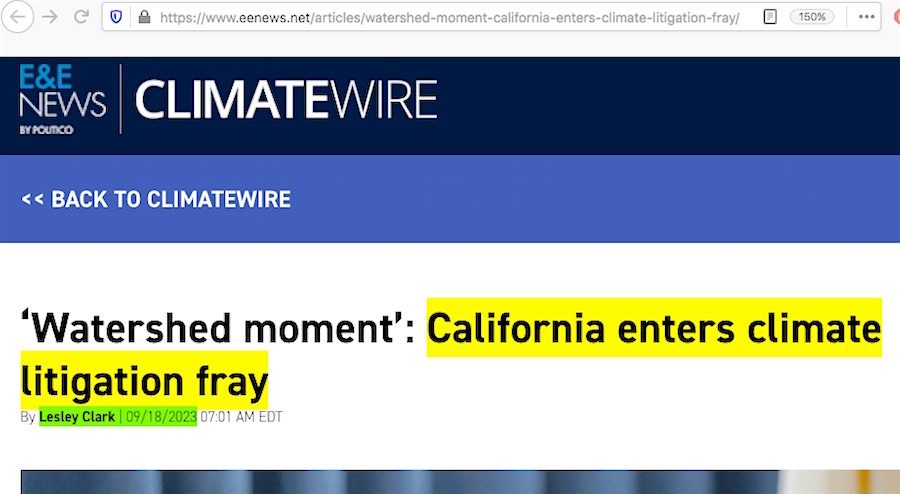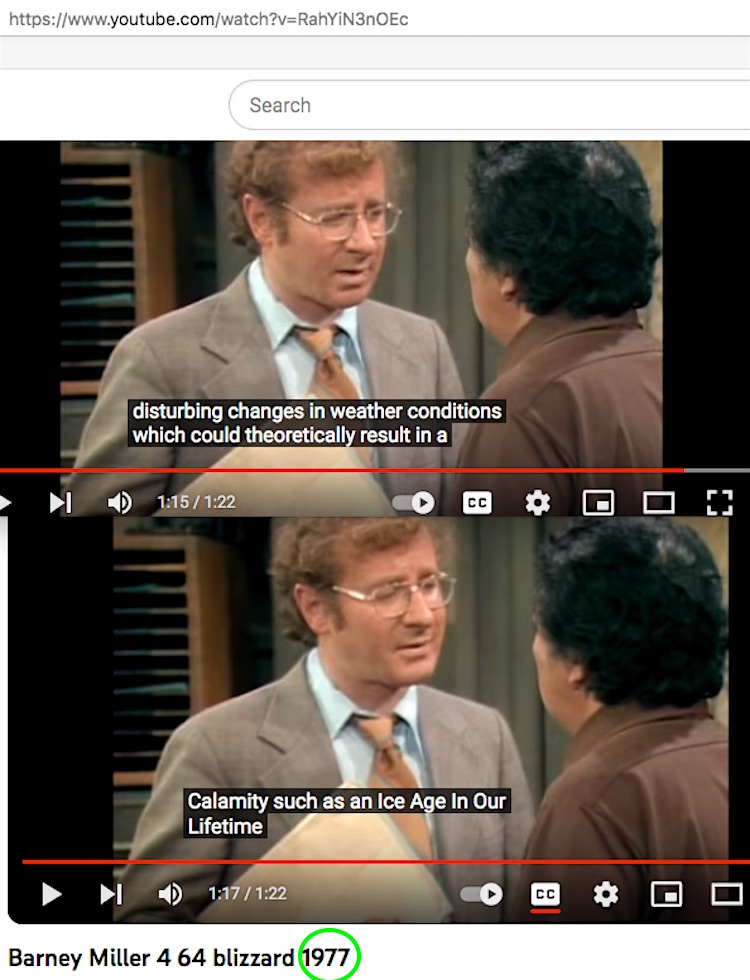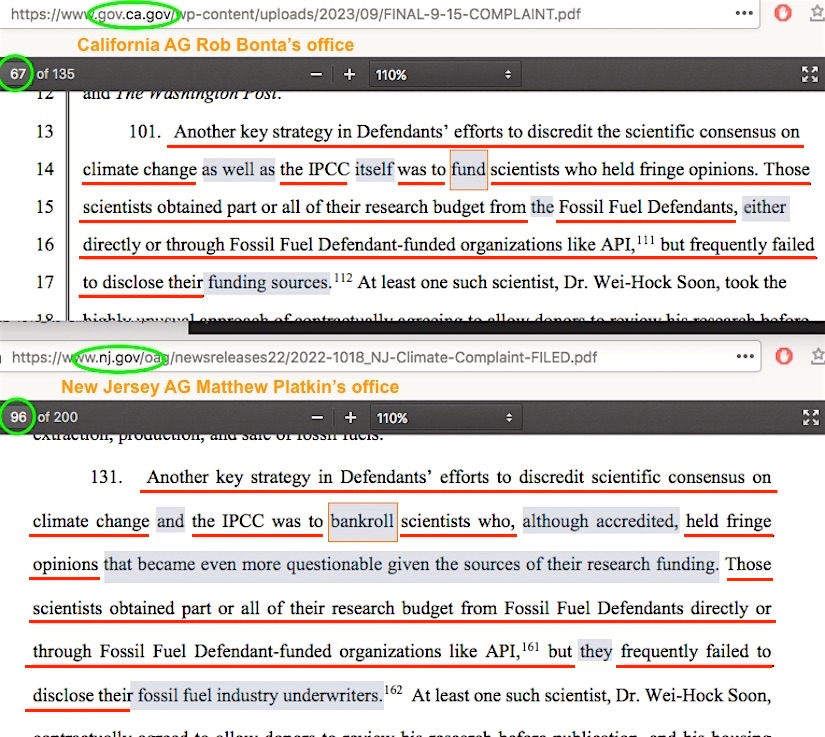Throw another one onto the “growing number” (growing number!) of “Exxon Knew”-style lawsuits which insinuate that ‘Big Oil’ knew the burning of fossil fuels harmed the environment but deceived the public by employing ‘shill’ climate scientists in ‘disinformation campaigns’ to say there was no harm. This latest Sept 15, 2023 filing appears to be no different than the 31 other “Exxon Knew” lawsuits I’ve dissected where it fits a pattern of repeating (plagiarizing?) material out of the others, from dubious ‘science certainty’ assertions to corruption accusations worded carelessly enough that they potentially stray into reckless disregard territory. I’ll get into how this latest one fits that pattern, but first, let me illustrate how the ‘news reports’ about it reinforce the problem that we no longer have an objective news reporting media, we have a propaganda media telling the public – working at the most basic of intellectually dishonest levels – about these lawsuits.
Sift though enough of the ‘news reporting’ about this lawsuit and the impression soon forms that, well, finally California has entered the fray of climate litigation to hold the fossil fuel industry accountable for the harm brought on by catastrophic Clima-Change™, inadvertently implying that while it’s late coming to the party, it’s late punch will be devastating. Associated Press: “California’s legal action joins similar lawsuits.” CNBC: “California’s complaint joins a wave of climate litigation.” Reuters: “it’s ominous for oil firms that the state has joined others.” Politico: “California’s legal action joins dozens of similar lawsuits.” E&E News: ‘Watershed moment’: California enters climate litigation fray.”

The 9/16/23 National Public Radio online article continued that basic theme, but went one increment farther by asking “Why Now?” as though California had been waiting for some particularly opportune time.
That was the wrong question.
The correct question is “Why Again??”
Wasn’t the two separate same-day filings back in September 2017 of People of the State of California v. BP PLC, et al. in San Francisco Superior Court and Alameda Superior Court more than adequate enough to get the point across?
Weren’t “The Peoples of CA v Big Oil” lawsuits filed by the San Francisco Sher Edling law firm between Sept 2017 and January 2018 for six California cities more than adequate enough? Aren’t the ten additional lawsuits filed by Sher Edling from Hawaii to Delaware approaching pure California-influence overkill? Isn’t the Sher Edling assistance into three more supposedly “independently-led” lawsuits starting to look like ‘California’ is the ‘man who came to dinner and now won’t leave?’ Does Sher Edling’s self-admitted takeover of those two California Superior Court lawsuits end up indicating that “California” is no late-comer here at all, but instead is the possibly ‘over-70-percentage-gorilla-in-the-room’ of all the current “Exxon Knew” lawsuits? Was the unsuccessful attempt to shoehorn that law firm into Florida lawsuits an indication that the whole U.S. “Exxon Knew” climate litigation is approaching almost an entirely California-influence effort?
Enviro-critics and semantics police critics will yowl, “The reports meant the entire state, represented by its Attorney General! The prior “People of the State of California” lawsuits in 2017 were not represented by the CA AG but instead the two major city AGs!” True. The commentator for the “California is suing big oil. Why doesn’t Colorado?” article made that distinction for his own state, but didn’t get around to noting until his seventh paragraph that Colorado – in a technical sense – had already entered the game.
But stop and think about that. Those two city attorneys and their pro hac vice attorney assistant Matt Pawa (that Pawa of Kivalina v Exxon fame) misinformed everyone on who the actual plaintiffs for their filing were? Plus, why shouldn’t the states with their own AGs who filed “Exxon Knew” lawsuits not get nationwide credit for launching a “watershed” lawsuit, such as New Jersey (with its Sher Edling pro hac vice help), or Minnesota (ditto about Sher Edling), or Delaware (& Sher Edling)? “Well . . . . those states are just not California!!”
Right.
News media reporters are being intellectually dishonest with both the public and themselves if they believe this State of California v. Exxon lawsuit is any kind of ‘first’ for California overall. It’s also quite clear from their ‘reporting’ that they have no intellectual curiosity about whether the central accusations in these have any merit — that Exxon knew runaway global warming was caused by the use of their product, and that Exxon colluded with skeptic climate scientists and other skeptic ‘shills’ in disinformation campaigns.
So on that latter note, let’s examine where this lawsuit shares fatal faults – just like the dozen+ similar lawsuits, which have suspect citations for their corrupt activity accusations. As loyal readers at GelbspanFiles know, this can get really repetitive, so I’ll just cover three fatally faulty claims which potentially could prompt any one of these lawsuits to be dismissed for being devoid of evidence to back up the claims.
First, with just a few exceptions among the other 28, nearly all of these lawsuits are enslaved to both ye olde notorious ‘leaked industry memos’ known as the “reposition global warming” set and ye olde 1998 American Petroleum Institute “victory will be achieved” set. The former set is absolutely the best the enviro-activists have in their arsenal to accuse fossil fuel execs of running sinister disinformation plans, the latter comes in as a weak second-best. Neither were ever implemented, they are worthless to serve as evidence because of that. In a flippant illustration, I put them together into a single silly indictment phrase to show how the Puerto Rico v Exxon lawsuit fit the pattern of enslavement to them. Massachusetts v. Exxon is enslaved singly to the “reposition global warming” memo set, as I noted in my dissection about the filing referring to it in an oddly cursory manner; nobody uses language like that, so it was unmistakable what the intent was. My dissections of District of Columbia v Exxon and Connecticut v. Exxon describe how each of those only featured the “victory” memo set as its cornerstone evidence about industry disinformation campaigns. The prior 2017 twin The People of CA v BP lawsuits did that, too.
It’s odd how those few lawsuits only chose to rely on the far less sinister-looking memo set. CA v Exxon makes that same strange choice. Notice in particular the innocuous-looking “DocumentCloud” link in footnote #109 for the memos. Where’ve we seen that before? Every single one of the Sher Edling filings, where, for unknown reasons so far, that law firm seems reluctant to share how Kert “tell the guards his name is Roland!” Davies was the person at Greenpeace who uploaded them to DocumentCloud a decade ago. Davies, who traces back prior to Greenpeace to the old Ozone Action group which is the place that gave ye olde “reposition global warming” memos their first, continuing media traction.
Next, this CA v Exxon repeats the narrative about a 1977 presentation made by James Black to Exxon, which supposedly proves Exxon knew with absolute certainty as far back as the 1970s that burning fossil fuels caused global warming. In my web browser, due to a possible glitch, the DocumentCloud link this filing cites for the report displays a blank page. There’s more than one way to skin a cat, as the old saying goes. I can at minimum drop the link into a Google search and see how the result spells out a portion of the page; Google displays the same thing in its text-only Cache result. The link opens on my smartphone. Who uploaded that page?
Roland C. “Kert” Davies. Davies. Davies. Those orangy smudges up at the top right of the document scan? Same seen right at his Climate Files page for the James Black Report (I get the same blank page glitch in my old computer’s browser – here’s the screencapture from my smartphone). Question is, why didn’t CA AG Bonta’s office dispense with the “DocumentCloud” link and just link straight to Davies’ Climate Files page? They already cite his pages eleven times, why not once more for the ‘most damaging industry memo evidence’ AG Bonta has?
As I showed in my dissection of Charleston v Brabham Oil, all of the Sher Edling boilerplate lawsuits feature the Black Report, but give them credit for linking straight to Climate Files. I also noted there how David Middleton’s September 2020 WUWT guest post analyzed the many faults of the Black Report, including its ‘cartoonly absurd’ graph predicting temperature outcomes that simply aren’t happening at the present time. But that’s only part of where this latest CA v Exxon and the other lawsuits go wrong on their claim that ‘Exxon Knew’ for certain that fossil fuel usage would cause catastrophic global warming.
There’s a gigantic hole in that claim, big enough to drive a Mack truck factory through. There’s no way possible Exxon could have known their products would cause global warming in the face of rampant reports across the spectrum back then on the potential for runaway global cooling. Over at Tony Heller’s blog (when efforts fail to erase his blog completely off the internet), he can describe for hours on end how the years prior to the late 1980s were awash with reports of global cooling. Even the TV sitcom “Barney Miller” had an episode in 1977 in which the brainy detective character explains the effects of killer cooling.

Third, CA AG Bonta’s office dug a hole for themselves even deeper than all the prior “Exxon Knew” lawsuits with this filing’s new ‘evidence citation’ twist for its accusation that skeptic climate scientist Dr Willie Soon is ‘on the payroll of Big Oil to spread disinformation.’ I didn’t have an opportunity to mention it in my 2018 dissection of Boulder v Suncor or my prior post followup on that lawsuit’s handlers having an apparently troubling association with Sher Edling, but the Boulder filing essentially accused Dr Soon of taking bribes from Exxon … sans any citation sources to support that accusation. The supposedly also ‘independently done’ Vermont v Exxon lawsuit did the same thing, just without mentioning Dr Soon. As I showed in my dissection of the Sher Edling Delaware v BP, all of their boilerplate copy lawsuits had the specific word “bankroll” in their accusation against Dr Soon, relying on a 2015 Smithsonian press release page as their evidence that he didn’t fully disclose his funding, where from Delaware onward to the last in their line, New Jersey AG’s Platkin v Exxon, they switched to citing an Internet Archive version of that press release. Notwithstanding that the Smithsonian press release merely stated that Smithsonian was only beginning its investigation of Dr Soon’s funding, of course. Only. Beginning. Allegations of wrongdoing are not proof of wrongdoing. The Oregon county Multnomah v Exxon filing – a seemingly plagiarized copy of Puerto Rico v Exxon as I detailed in my dissection of Multnomah – featured the same “bankroll” accusation that Puerto Rico had, but the twist there (having the Sher Edling “bankroll” accusation repeated too similarly to be a coincidence) is that both of those lawsuits inexplicably had the “LegiStorm” page’s copy of the 2015 Smithsonian press release. LegiStorm is a database of Capitol Hill staffers, not an archive site for museum press releases.
What’s the egregious twist in the CA v Exxon accusation against Dr Soon? AG Bonta’s office didn’t use an Internet Archive version of the Smithsonian press release. They didn’t use the wacko LegiStorm link. They didn’t point to the Smithsonian press release at all. They cited a SmithsonianMag.com 2015 article about the news of Dr Soon’s ‘undisclosed $1.2 million Exxon bribe.’ The article author only goes so far as to say the New York Times broke the news of this situation, and that the accusation comes from Greenpeace and some outfit called the ‘Climate Investigations Center.’ Readers have to read all the way to the bottom before they get to the bit about the Smithsonian Institute only beginning their inquiry. Who does the NYT hit piece say runs the Climate Investigations Center? Wait for it …… Kert Davies — who mere days before this ‘big news exposé’ was described in an email by the Rockefeller Family Fund Director Lee Wassermann to the New York Attorney General’s office as Roland Davies.
Why did the Smithsonian Institute apparently felt a need to take their press release offline about investigating Dr Soon? As Dr Soon said in this Oct 2022 video clip – the result of the 5 year Smithsonian investigation is that he committed no wrongdoings. If the Smithsonian had found anything that even remotely resembled Dr Soon hiding this ‘Exxon funding’ situation, wouldn’t the revelation had been broadcasted to the entire world by every one of Dr Soon’s detractors from Davies to Desmogblog??
Let me emphasize this again: Allegations of wrongdoing are not proof of wrongdoing.
One more thing here, regarding AG Bonta’s office’s specific wording against Dr Soon: where have we seen that before, in nearly the identical, straying-into-plagiarism-territory? The last in the line of the Sher Edling lawsuits, NJ AG Platkin’s filing. I highlight the wording differences in gray.

In the Sept 20th broadcast of the PBS NewsHour, its host interviewed AG Bonta about his lawsuit, initially handing him a softball question about the complicity of fossil fuel companies in deceiving the public on what they knew, and then later posing a question based on the false premise that the industry was already guilty of causing …… weather events. No joke.
Those were the wrong questions. A proper, objective, hard-nosed investigative team would have carefully read through the filing, done background research on similar filings, spotted items to question, and compiled these kinds of questions for the host to ask:
• Your suit alleges that as far back as the 1960s and ’70s that the industry as a whole knew for certain that usage of their products could lead to catastrophic global warming. How do you justify that in the face of so many news reports and analysis during that time that the Earth might be headed into a period of significant cooling?
• In your suit, you allege that a particular set of memos, which at least at first glance, seem to be not much more than a set of truisms about how the public might become better informed after learning about what skeptic climate scientists have to say. How do you prove there was an outright conspiracy to deceive the public based on the wording of those memos?
• Regarding industry-paid corruption of skeptic climate scientists, one of your footnote references was to a 2015 article about a scientist working at that time for the Smithsonian Institute where the allegation was that the scientist failed to disclose Exxon-sourced million dollar-plus funding of his work and the end of the article noted that the Smithsonian Institute was undertaking an investigation as to whether he violated funding disclosure requirements there. Do you know what the Smithsonian Institute’s investigation results were?
Truth of the matter is, after objective examination, this latest People of the State of California v. ExxonMobil lawsuit is not a watershed legal action in the least, it is little more than a repackaged repetition of prior lawsuits among a larger lineage of efforts dating back to the late 1990s** to defame the fossil fuel industry and skeptic climate scientists. And the coverage of this latest lawsuit once again illustrates mainstream media journalism malfeasance on the overall climate issue.
——————————————————————
**(Don’t get me started on the intellectually dishonest accusation in that screencapture about Dr S Fred Singer’s “Exxon/Shell/ARCO/Unocal/Sun Oil funding,” and how the last objective reporting about such accusations was done in 1994 by ABC Nightline’s Ted Koppel)
